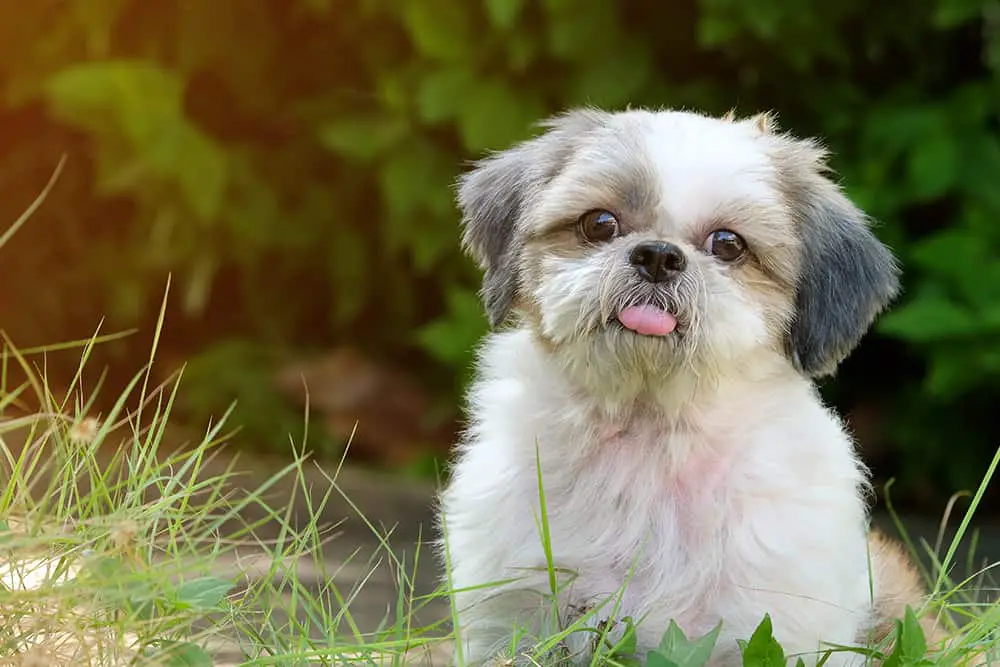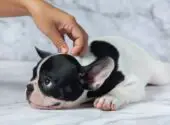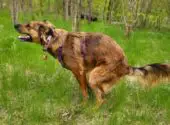Part of the responsibility of owning a dog is accepting that its lifespan will be considerably short compared to your own.
It’s always best to understand the expected length of an animal’s lifespan before you commit to owning it, because otherwise you could end up in a commitment longer or shorter than anticipated.
If you’re looking to welcome a Shih Tzu into your home, or perhaps if you already have a beloved Shih Tzu, you’re probably wondering: “How long do Shih Tzus live for?”
You might also be wondering about what factors can affect their expected lifespan, such as hereditary issues and any health problems that the breed is prone to developing.

Shih Tzus are a wonderfully intelligent and affectionate toy breed that make brilliant companions and family members, which is why it’s so hard to accept the fact you will eventually lose your Shih Tzu.
Here is everything you need to know about the Shih Tzu lifespan, including tips on how to extend the expected lifespan and how to give your dog the best life possible!
Average Life Expectancy Of A Shih Tzu
The expected lifespan of a Shih Tzu is between 10 and 16 years, with the average lifespan being 13 years. As the average lifespan of all dog breeds is 12.67, Shih Tzus don’t have an abnormally long or short lifespan.
It is suggested that female Shih Tzus live around 1.5 years longer than males, but the reasons for this are unclear.
With their life expectancy, it might be safe to assume that Shih Tzus are a generally healthy breed. However, due to the size and build of this breed, Shih Tzus aren’t free from developing health problems, which can significantly impact their lifespan.
Of course, some dogs defy the rules of their breed’s expected lifespan. For example, the longest living Shih Tzu (called Smokey) lived up to 23 years of age. Smokey is proof that with good care, a lot of love, and a dash of luck, Shih Tzus can live very long and healthy lives!
Shih Tzu Common Health Problems
Virtually every dog breed comes with their own common health problems that can either be hereditary or developed as they age. While most of these health problems can be prevented and treated (thanks to the wonders of modern veterinary care and medication), some are slightly more complex.
Here are the most common health problems amongst Shih Tzus!
Hip Dysplasia
Hip dysplasia is a common health problem that most dog breeds risk developing. In most cases, hip dysplasia occurs in big dogs who grow into their bodies too fast. However, small dogs like Shih Tzus are also prone to developing hip dysplasia.
For toy breeds like Shih Tzus, their bones, muscles, and joints are all appropriately sized to fit their small stature.
However, Shih Tzus are energetic dogs who love to jump around and play, especially as puppies, which means that they can often overestimate their active abilities.
With this overestimation, a Shih Tzu might assume that they can continue their active nature into an old age, which might lead to a displacement between the thigh bone and joint.
Hip dysplasia shows itself in various ways depending on the severity of the pain and the tolerance level of the dog. In most cases, a dog with hip dysplasia will have a constant limp and an abnormal gait.
If the pain isn’t severe, the dog can live happily with the help of pain medication. If the pain is severe, however, the hip dysplasia can lead to surgery or immobility.
Collapsing Trachea
For brachycephalic dogs like Shih Tzus, Pugs, Boston Terriers, and Chihuahuas, breathing problems are a common health issue due to the structure of their face. Shih Tzus have “squished” faces, which is why they are such heavy breathers.

Collapsing trachea is a condition in which the trachea or windpipe (made of cartilage) can often weaken, resulting in painful and inconsistent breathing. In most cases, dogs with a collapsed trachea learn to live with their new style of breathing. However, if the trachea has collapsed completely, surgery will be necessary.
Progressive Retinal Atrophy (PRA)
Unfortunately, due to the shape of their large eyes, Shih Tzus are prone to developing eye problems.
Progressive Retinal Atrophy is when the photoreceptors (towards the back of the eye) fail, resulting first in night blindness which then gradually turns into daytime blindness.
Unfortunately, there is currently no cure to Progressive Retinal Atrophy. The only thing you can do is keep an eye on symptoms of PRA, such as clumsiness and swollen red eyes, and get a diagnosis as early as possible.
With an early diagnosis, your dog will learn to adapt to being blind thanks to a treatment plan given by your vet.
Keratitis
Another common eye problem amongst Shih Tzus is Keratitis, which is where the cornea becomes so inflamed it turns into an ulcer. This ulcer can be removed with a surgical procedure, but it can lead to blindness if left untreated.
Proptosis
Proptosis is yet another horrible eye disease that occurs in Shih Tzus. This is the medical term for “bulging eyes”, and it refers to when the eyes bulge so far out of the socket that the eyelid closes behind the eyeball.
This is an incredibly painful condition that requires surgery and will mostly lead to blindness. Early signs of proptosis include inflammation and, eventually, the increased “bulge” of the eyes.
Ear Infections
Shih Tzus have floppy ears, which is adorable for humans to look at, but is actually really inconvenient for the dogs. Floppy ears mean the ear canal is constantly warm and has little airflow, which can lead to the harboring of bacteria.
The clearest physical symptoms of an ear infection is if your dog’s ears smell bad, or if they seem extra skittish at loud noises. Vets can treat ear infections with medication and ointments.
Allergies
Small dogs are prone to allergies in the same way that humans are. Most allergies in dogs are caused by food, pollen, grass, and certain products like shampoo.
Finding out what your dog is allergic to involves a process of elimination with the food and products they come into contact with.
Symptoms of allergies include itchiness, an upset stomach, lack of appetite, and red eyes. Allergies can be cared for by a vet if it’s serious, but in most cases, the only cure is to keep your dog away from whatever it is allergic to.
Spine Problems
Similar to hip dysplasia, the size of a Shih Tzu means that they are prone to developing spine issues. It’s all due to the size of the breed and their energy levels – remember that they can get over-enthusiastic, thus overestimating their abilities and taking it too far.
Intervertebral Disk Disease is a spine problem that occurs in dogs with little legs and large backs, such as Shih Tzus.
This is when the disk slips out of the spine and presses against the spinal nerve, resulting in weakness, extreme pain, sensitivity, and difficulty walking. In the worst cases, paralysis can occur.
While there is no current cure for this disease, there are treatments and surgeries available to lessen the pain.
Accidental Reasons For A Shortened Lifespan
Unfortunately, even the healthiest of dogs are exposed to accidents that can significantly shorten their expected lifespan. It’s not nice to think about potentially life-threatening accidents, but it’s something that dog owners have to come to terms with in order to make preventative measures to keep their dog safe.

Such examples of these accidents include theft, car accidents, injuries, catching bacteria and viruses from other animals, dog fights, and exposure to chemicals or drugs.
It all comes down to being vigilant and committing to proper training when your dog is young.
If you like to walk them off the lead, ensure that they are friendly with others and that they are properly recall trained. Make sure they don’t eat or lick any animal feces, as this can be home to nasty viruses such as parvovirus.
How To Extend The Lifespan Of Your Shih Tzu
Every dog owner wants their dog to live forever, which is why it’s so important to give your Shih Tzu the healthiest life they can possibly lead. Here are our tips on how to extend the lifespan of your Shih Tzu!
Buy Them From The Right Place
Everyone knows that the best way to get a dog is to adopt one. However, due to the popularity of the Shih Tzu breed, they don’t often appear in rescue shelters.
This means that if you have to buy a Shih Tzu, it’s vital that you buy them from a reputable breeder. Reputable breeders will have done genetic testing on the parents of the litter, and they will willingly show you the medical records of all the dogs involved in the litter.
This will give you trust that the puppies have been brought up in a healthy and safe environment – plus it will give you a heads-up about potential health problems in the future.
Backyard breeders, however, don’t care for the health of their dogs. They will only care about selling their puppies at a high price. Make sure that you always ask for medical records, visit the litter in person to inspect the home, and only take home a puppy at 8 weeks old. The puppy should also have been vaccinated, wormed, and microchipped.
Regular Health Check-ups
Dogs need to go to the vets occasionally in the same way that cars do to make sure they are healthy and happy.
While veterinary appointments can be expensive, the cost is definitely worth it, because the vet might be able to diagnose a problem in its earliest stages. The earlier the diagnosis, the more effective the treatment will be!
Diet And Exercise
Shih Tzus, like most toy dogs, are prone to gaining weight and becoming obese due to improper diet.
It’s always best to go for high-quality dog food that is high in protein and low in carbs and artificial fillers, as these can promote weight gain. You should also only feed them according to their age.
While Shih Tzus are small, it doesn’t mean they don’t need much exercise! All dogs need to be walked at least once a day, and due to the risk of obesity in Shih Tzus, exercise is vital.
However, you also don’t want to push it, because Shih Tzus are also prone to injuries as a result of over-exercising.
Don’t Leave Them Alone
Shih Tzus are notoriously anxious dogs. Even with years of training, most Shih Tzus will have varying degrees of separation anxiety.
This means that it’s best to not leave them alone for extended periods, as this can lead to more complicated symptoms of anxiety and stress.
Any form of anxiety will affect the quality of the dog’s life, which is why Shih Tzus should only live in households where there is almost always someone at home. Leaving them alone won’t exactly knock years off their lifespan, but it will certainly affect their quality of life!
Grooming
Shih Tzus have long hair, which means it needs to be brushed, washed, and trimmed regularly! Without frequent grooming, Shih Tzus can develop painful knots in their coat which pull on the skin.
Washing and brushing the hair will help to get rid of any lingering bacteria and dirt. On the plus side, Shih Tzus are hypoallergenic, so they don’t shed!
Shih Tzus will also need to have their ears cleaned, nails trimmed, and teeth cleaned regularly.
Dental Care
Shih Tzus have small jaws, which means that their teeth are often overcrowded. This isn’t necessarily painful for the dog, but it can lead to dental issues such as gum diseases because food will get stuck between their teeth.

Kibble is the best dog food to prevent food from getting stuck in their gums, but you should also brush your dog’s teeth after they eat. Dental chew treats are a great way to treat your dog and keep up their oral hygiene, too!
Spaying And Neutering
Reputable breeders will generally only sell their litters on the basis that the puppies will not be bred from to prevent spreading any health problems.
Spaying and neutering are very important for the health of your Shih Tzu – not only will these surgeries prevent unwanted pregnancies, but spaying and neutering will also prevent pyometra, bowel movement problems, and prostate cancer.
Caring For An Old Shih Tzu
The time will inevitably come when your Shih Tzu reaches their senior years (which is usually around 8 years old).
Caring for an old Shih Tzu isn’t too dissimilar from caring for them at any other age, you’ve just got to be extra mindful of their age. Like humans, with age comes the increased risk of health problems.
This means they shouldn’t be exercised as much as they used to be, you should prevent them from jumping up and down from furniture, and they might need a change in diet. Here are our tips on how to care for an old Shih Tzu:
- Commit to frequent veterinary visits to keep on top of their health and look out for any early diagnoses
- Groom your dog more often
- Walk them less, or commit to shorter walks
- Keep your dog hydrated and warm
- Give them lots of care and affection
- Stop giving them treats as this will promote weight gain (especially with the lack of exercise)
- Don’t keep them alone for long periods if you are worried about their health
Saying Goodbye To Your Shih Tzu
Everything must come to an end, including your beloved Shih Tzu’s life. Saying goodbye to a pet is one of the hardest things you will ever do, and even though it’s “just a dog”, the dog was still a vital part of your family.
The best way to say goodbye to your dog is to provide them with the most comfortable life possible. This means lots of cuddles, warmth, and love!
In the event where you have to choose between putting your dog to sleep or not, sometimes it’s kinder to send them off into a peaceful and pain-free slumber than let them suffer.
You’ve just got to remember the wonderful times you had with your dog, and remember that they only knew you for their whole lives, which is pretty wonderful.




